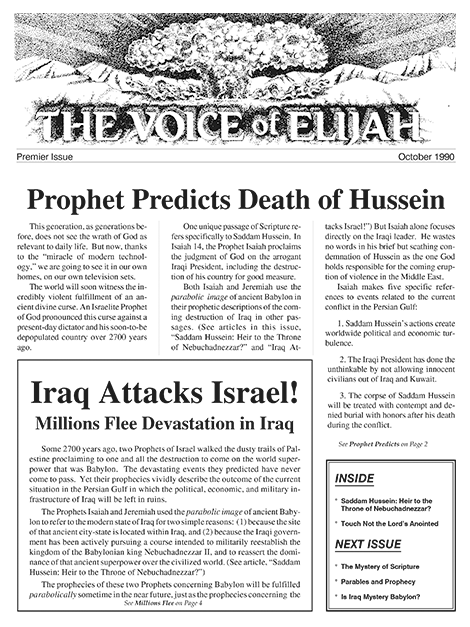Excerpt From Book
In tracking the promise through the Scriptures, we have seen that Abraham, Isaac, and Jacob all possessed the promise as the heir of the promise. All three also enjoyed partial benefit from holding equitable title to what was promised, and each of them conveyed the promise in a spoken blessing to his son(s) as an inheritance. But when Jacob handed down the promise, he included his two grandsons in the blessing. Thus the promise became fragmented and could no longer be inherited by a single heir of the promise. But that was the case only until God ratified the Mosaic Covenant with all the sons of Israel at Mt. Sinai.1
The Mosaic Covenant made all potential heirs of the promise members of Corporate Israel, the Firstborn Son of God. But in so doing, it also unified the promise, making it once again the inheritance of just one Person, Corporate Israel, the Heir of the promise. The Scriptures, however, tell us the Mosaic Covenant was not the only covenant God made with an heir of the promise who held title to the promise. Earlier, He had made the Covenant of Circumcision with Abraham.2 Both the Covenant of Circumcision and the Mosaic Covenant imposed conditions that restricted who could and could not qualify to receive what was promised. But the provisions of these covenants were also intended to determine when the Heir of the promise was fully qualified to receive legal title to what was promised at the time of the fulfillment of the promise.
By imposing the conditions in these two covenants, God made it clear that some who were potential heirs of the promise would never receive legal title to what was promised when the time came for the fulfillment of the promise. Those who were unqualified to receive legal title to what was promised would, like Esau, receive only the curse of God because they failed to meet the specified conditions. But those who adhered to the terms of the covenant would not only be qualified to receive what was promised, they could also enjoy benefits derived from holding equitable title to what was promised. For example, God allowed Corporate Israel to inhabit the Promised Land from the Conquest to the time of the Babylonian Exile. That was clearly a blessing. It meant the sons of Israel no longer had to continue the semi-nomadic existence they endured while wandering in the wilderness. Instead, they were able to live and prosper in their own land.
The greatest benefit the members of Corporate Israel, the Heir of the promise, could enjoy was their relationship to the Almighty God, the Creator of Heaven and Earth. I am going to explain that facet of the promise in this chapter. When the true intentions of God are known, this part of the promise is clearly the focus of His plan for Corporate Israel.3
“I Will Be Your God …” A single statement concisely summarizes the essence of God’s relationship to Corporate Israel. It is a two-part declaration in which each segment contributes the reciprocal of the other: “You will be My People; I will be your God.” Together, these two statements describe the blending of the human with the divine, the relationship of God and man once again restored to what God intended. They are an integral part of what I call the “Covenant Manifesto” of God’s covenant with Corporate Israel, the Firstborn Son of God and Heir of the promise. This summary statement of God’s ultimate intention flows through the Scriptures like a mighty river. Yet the phrase begins as a mere trickle in a solitary passage tucked away in the Book of Genesis. But the context is one we have already seen several times before. When God made the Covenant of Circumcision with Abraham, He said this:
“As for Me, behold, My covenant is with you, And you shall be the father of a multitude of nations. No longer shall your name be called Abram, But your name shall be Abraham; For I will make you the father of a multitude of nations. And I will make you exceedingly fruitful, and I will make nations of you, and kings shall come forth from you. And I will establish My covenant between Me and you and your descendants after you throughout their generations for an everlasting covenant, to be God to you and to your descendants after you. And I will give to you and to your descendants after you, the land of your sojournings, all the land of Canaan, for an everlasting possession; and I will be their God.”
(Genesis 17:4–8)
The statement “I will be their God” provides the base on which God had only just begun to lay the “foundation” of His “House.” Its importance to the biblical message cannot be overemphasized. It provides a key to the innermost chambers of The Mystery of God’s Word. But even in its incipient form the statement reveals a divine intent of enormous proportions. It says simply that God is going to establish a relationship with a specific segment of mankind. He is going to be the personal God of a select group of people, the Elect of all humanity, those who will hold equitable title to the promise of God until the fulfillment of the promise, at which time they will receive legal title to what was promised.
God does not tell us at this point that some of Abraham’s “seed” will eventually become members of Corporate Israel—the Firstborn Son of God Who will be the designated Heir of the promise. Neither does He give the slightest inkling that Corporate Israel will ultimately gain legal title to what was promised. Concerning how or when all that is to take place, He doesn’t say a word. All He says is, “I will be their God.”
1Exodus 19–24.
2Genesis 17:1–14.
3See The Inheritance of the Believer, Volume 1.
Larry Dee Harper, Not All Israel Is Israel, pp. 85–87
Newsletter Details
| Contribution of | $20.00 |
|---|---|
| Author | Larry Dee Harper |
| Pages | 217 |
| Publisher | The Elijah Project |
| Released | August 2009 |
| Language | English |
The Truth is Available
Check Out the Online Library
Browse through our library of newsletters and booklets—absolutely free!
Start Reading Now



